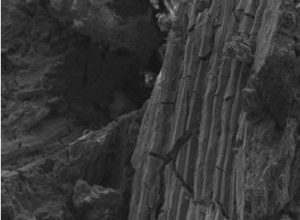Rosa Turco, Domenico Zannini, Salvatore Mallardo, Giovanni Dal Poggetto, Riccardo Tesser, Gabriella Santagata, Mario Malinconico, Martino Di Serio
Polymer Degradation and Stability, 2021, 109576 https://doi.org/10.1016/j.polymdegradstab.2021.109576
Abstract
Cynara Cardunculus plant was used as source of seed oil. The epoxidized oil (ECO) and presscake waste fibers (CP) recovered from post-oil extraction, were recombined for developing PLA functional biocomposites, according to “zero waste” circular economy approach. Different compositions of PLA/CP and PLA/CP/ECO were prepared in form of platelets and investigated by thermal, morphological, structural and mechanical analyses. The poor interfacial adhesion between the hydrophobic PLA matrix and short, hydrophilic and randomly dispersed presscake fibers, well evidenced by morphological analysis, was responsible of PLA thermal degradation hastening, Tg decreasing and tensile properties dropping down, since no mechanical stress transfer occurred from the polymer to the dispersed phase. The inclusion of ECO slightly improved the above properties due to its mild compatibilizing action inducing a fairly tightening of the macromolecular structure. The recycling of CP waste fibers was effective in hastening the polymer biodegradation in common soil under environmental conditions. Indeed, biocomposites recovered after 90 days of soil burial tests evidenced morphological features typical of late stage PLA biodegradation, a drastic dropping down of molecular weights and a decreasing of PLA thermal stability. These experimental evidences, not detected in soil buried neat PLA, assessed that the inclusion of CP waste fibers inside PLA matrix, represented a valid route to promote a fast and easy PLA biodegradation if compared to the composting method commonly used, for which severe atmosphere conditions and specific microbial population are necessary.
